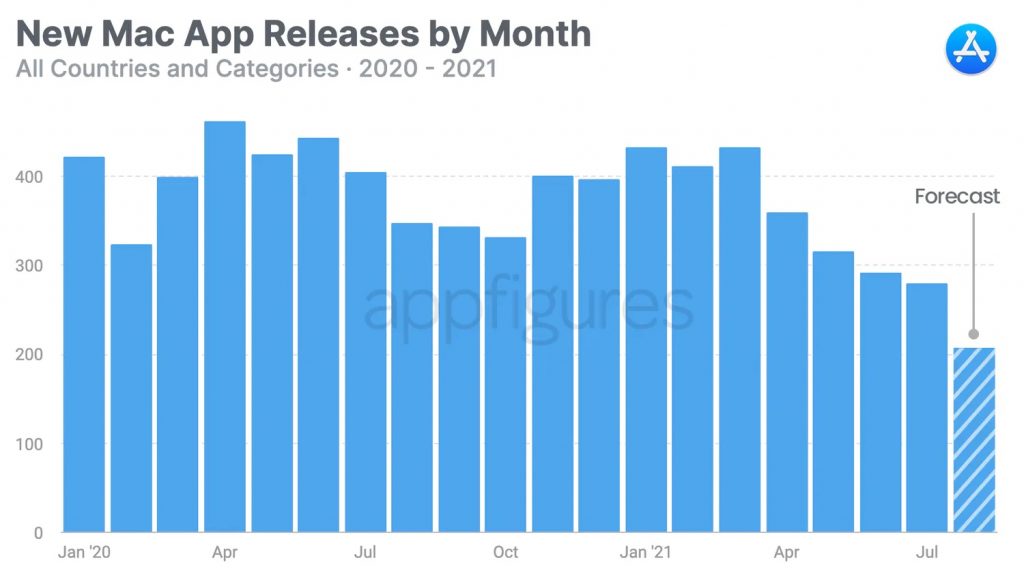
Analysis conducted by Appfigures suggests that developers are losing interest in macOS.
The number of Mac app releases has been on a steady decline for years, but Appfigures has noted a rapid decrease in recent months that shows no sign of slowing:

In 2020, developers released 392 apps on average per month. In 2021, that’s dropped to 343 per month.
Appfigures isn’t too optimistic about the outlook going forward and forecasts a drop to the low 200s for August onwards.
To put all of this in context, the iOS App Store continues to thrive with 40,000 new apps on average every month in 2020. Apple itself last year said that it receives more than 100,000 apps or app updates per week for iOS.
Apple’s decision to begin using its own silicon – starting with the M1 – for its latest Mac and iPads, shows how the line is blurring between the two more than ever.
Now that iPad and iPhone apps are supported on M1-powered Mac devices it seems only a matter of time before the market share of M1 Macs reaches a point where more Mac developers decide to focus their efforts on iPad apps to benefit from the marketshare of both platforms.
Ariel Michaeli, CEO and Founder of Appfigures, wrote in a blog post:
“With the new M1 processor, the promise of iOS apps on desktop became real, and I see a lot of potential there for many developers. But… the way I see it, this can go in two very different directions.
Once enough M1-equipped computers are in the hands of consumers, and given how many apps will become available instantly, users will be forced to use the Mac App Store to get apps. Or, another possibility is that because the Mac App Store isn’t a destination at all, users will skip the experience altogether and continue to use iOS apps where they were intended to be used, on phones, and this opportunity will die.
I would love to see the former, but without major changes from Apple, I’m ready for the latter.”
At this point, it seems only a decision to enable support for macOS apps on iPadOS could stem the decline in new Mac apps. Given how Apple increasingly believes the iPad can replace your laptop and recently added proper touchpad support, it might not be such a wild idea.
(Photo by Magnet.me on Unsplash)
Want to learn about DevOps from leaders in the space? Check out the DevOps-as-a-Service Summit, taking place on 1 February 2022, where attendees will learn about the benefits of building collaboration and partnerships in delivery.








It is not on Apple other developers chose to opt out of it despite the fact that the apps work almost flawlessly with macOS the fact of the matter is developers have to allow their apps to be installed on the Mac it is now on Apple because developers chose this a good example would be call of duty mobile a very great and unique Game both loved on iOS and iPadOS and because developers did not opt for apps to be installed the potential was lost
Seems logical. Plenty of decent iOS apps that could be updated to support bigger screens and full keyboard input rather than just touch while remaining fundamentally the same.
Apple never bothered to focus on the Mac OS App Store and it was always separate from IOS apps. People using Mac’s never really gravitated towards the App Store anymore then Windows users did for that App Store. In much of the world Android is by far the most popular platform. I would assume developers would focus on platforms with the most benefit to them?